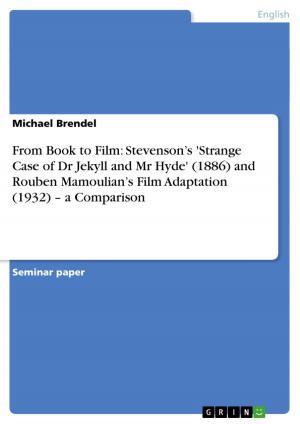Empiricism vs. Rationalism: The Innate Character of Language
Nonfiction, Reference & Language, Language Arts, Linguistics| Author: | Yvonne Bogataj | ISBN: | 9783638359955 |
| Publisher: | GRIN Publishing | Publication: | March 22, 2005 |
| Imprint: | GRIN Publishing | Language: | English |
| Author: | Yvonne Bogataj |
| ISBN: | 9783638359955 |
| Publisher: | GRIN Publishing |
| Publication: | March 22, 2005 |
| Imprint: | GRIN Publishing |
| Language: | English |
Seminar paper from the year 2005 in the subject Speech Science / Linguistics, grade: 1 (sehr gut), University of Marburg, course: Psycholinguistics, 28 entries in the bibliography, language: English, abstract: Introduction How do children acquire language? As Susan H. Foster-Cohen put it in her book An Introduction to Child Language Development, most parents would reply either that they taught their children how to speak or that their children learned language 'from hearing it and from being spoken to' (Foster-Cohen 1999: 95). This statement brings along further questions: Are children really dependent on input from their environment? If they are, when do they need to get what amount of input? And, more specifically, what sort of input do they need? There is a huge amount of different theories regarding children's first language acquisition and the most important ones will be depicted in my term paper. At first, we will get a general overview on the different phases or stages a child goes through during language acquisition. Then, we will see some strange or 'secret' phenomena, which bring along the question whether children only learn language by imitation as stated above by several parents, or if there might be an innate knowledge about how language could look like. We will then differentiate between the empiricist and rationalist positions that were represented by Locke and Descartes in the 17th/18th century. These positions have been examined and developed since then and will lead us to take a closer look at more modern theories. Piaget's constructivist theory as well as Chomsky's innateness hypothesis will be depicted and discussed in my term paper. Finally, we will see an example that demonstrates the important problem of the time limit for language acquisition. We will finally discuss whether this problem is contradictory to Chomsky's innateness hypothesis.
Seminar paper from the year 2005 in the subject Speech Science / Linguistics, grade: 1 (sehr gut), University of Marburg, course: Psycholinguistics, 28 entries in the bibliography, language: English, abstract: Introduction How do children acquire language? As Susan H. Foster-Cohen put it in her book An Introduction to Child Language Development, most parents would reply either that they taught their children how to speak or that their children learned language 'from hearing it and from being spoken to' (Foster-Cohen 1999: 95). This statement brings along further questions: Are children really dependent on input from their environment? If they are, when do they need to get what amount of input? And, more specifically, what sort of input do they need? There is a huge amount of different theories regarding children's first language acquisition and the most important ones will be depicted in my term paper. At first, we will get a general overview on the different phases or stages a child goes through during language acquisition. Then, we will see some strange or 'secret' phenomena, which bring along the question whether children only learn language by imitation as stated above by several parents, or if there might be an innate knowledge about how language could look like. We will then differentiate between the empiricist and rationalist positions that were represented by Locke and Descartes in the 17th/18th century. These positions have been examined and developed since then and will lead us to take a closer look at more modern theories. Piaget's constructivist theory as well as Chomsky's innateness hypothesis will be depicted and discussed in my term paper. Finally, we will see an example that demonstrates the important problem of the time limit for language acquisition. We will finally discuss whether this problem is contradictory to Chomsky's innateness hypothesis.















